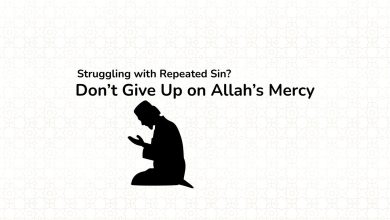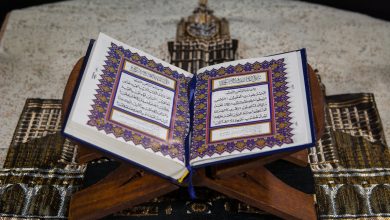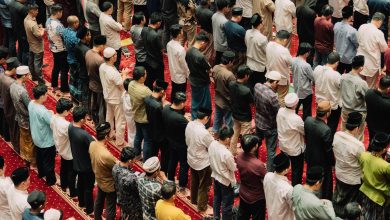Muhammad (PBUH) The Prophet of Islam – His Biography [Part 3]
Introduction to Islam
Muhammad (PBUH) The Prophet of Islam – His Biography [Part 2]
Migration to Madinah
The annual pilgrimage of the Ka’bah brought people from all parts of Arabia to Mecca. The Prophet Muhammad (PBUH) tried to persuade one tribe after another to afford him shelter and allow him to carry on his mission of reform. The contingents of fifteen tribes, whom he approached in succession, refused to do so more or less brutally, but he did not despair. Finally he met half a dozen inhabitants of Madinah who being neighbours of the Jews and the Christians, had some notion of prophets and Divine messages. They knew also that these “people of the Book” were awaiting the arrival of a prophet — a last comforter. So these Madinans decided not to lose the opportunity to obtain an advance over others, and forthwith embraced Islam, and furthermore promised to provide additional adherents and necessary help from Madinah. The following year, a dozen new Madinans took the oath of allegiance to him and requested him to provide them with a missionary teacher. The work of the missionary, Mus’ab, proved very successful and he led a contingent of seventy-three new converts to Mecca, at the time of the pilgrimage. These invited the Prophet and his Meccan companions to migrate to their town, and promised to shelter the Prophet and to treat him and his companions as their own kith and kin. Secretly and in small groups, the greater part of the Muslims emigrated to Madinah. Upon this, the pagans of Mecca not only confiscated the property of the evacuees, but devised a plot to assassinate the Prophet. It now became impossible for him to remain at home. It is noteworthy to mention that in spite of their hostility to his mission, the pagans had unbounded confidence in his uprightness and honesty, so much so that many of them used to deposit their savings with him. The Prophet Muhammad (PBUH) now entrusted all these deposits to ‘Ali, a cousin of his, with instructions to return in due course to the rightful owners. He then left the town secretly in the company of his faithful friend, Abu-Bakr. After several adventures, they succeeded in reaching Madinah in safety. This happened in 622, whence starts the Hijrah calendar.
Reorganization of the Community
For the better rehabilitation of the displaced immigrants, the Prophet created a fraternization between them and an equal number of well-to-do Madinans. The families of each pair of the contractual brothers worked together to earn their livelihood, and aided one another in the business of life.
Further he thought that the development of the man as a whole would be better achieved if he co-ordinated religion and politics as two constituent parts of one whole. To this end he invited the representatives of the Muslims as well as the non-Muslim inhabitants of the region — Arabs, Jews, Christians and others — and suggested the establishment of a City-State in Madinah. With their assent, he endowed the city with a written constitution (the first of its kind in the world) in which he defined the duties and rights both of the citizens and the head of the State. The Prophet Muhammad (PBUH) was unanimously hailed as such, and abolished the customary private justice. Henceforward, the administration of justice became the concern of the central organization of the community of the citizens. The document laid down principles of defence and foreign policy; it organized a system of social insurance, called ma’aqil, in cases of too heavy obligations. It recognized that the Prophet Muhammad would have the final word in all differences, and that there was no limit to his power of legislation. It recognized also explicitly the liberty of religion, particularly for the Jews, to whom the constitutional act afforded equality with Muslims in all that concerned life in this world (cf. infra n. 303).
Muhammad (PBUH) journeyed several times with a view to win the neighbouring tribes and to conclude with them treaties of alliance and mutual help. With their help, he decided to bring to bear economic pressure on the Meccan pagans, who had confiscated the property of the Muslim evacuees and also caused innumerable damage. Obstruction in the way of the Meccan caravans and their passage through the Madinan region exasperated the pagans, and a bloody struggle ensued.
In the concern for the material interests of the community, the spiritual aspect was never neglected. Hardly a year had passed after the migration to Madinah when the most rigorous of spiritual disciplines, the fasting for the whole month of Ramadan every year, was imposed on every adult Muslim man and woman.
Struggle Against Intolerance and Unbelief
Not content with the expulsion of the Muslim compatriots, the Meccans sent an ultimatum, to the Madinans, demanding the surrender or at least the expulsion of Muhammad (PBUH) and his companions but evidently all such efforts proved in vain. A few months later, in the year 2 H., they sent a powerful army against the Prophet, who opposed them at Badr, and the pagans thrice as numerous as the Muslims, were routed. After a year of preparation, the Meccans again invaded Madinah to avenge the defeat of Badr. They were now four times as numerous as the Muslims. After a bloody encounter at Uhud, the enemy retired, the issue being indecisive. The mercenaries in the Meccan army did not want to take too much risk, or endanger their safety.
Meanwhile the Jewish citizens of Madinah began to foment trouble. About the time of the victory of Badr, one of their leaders, Ka’b ibn al-Ashraf, proceeded to Mecca to give assurance of his alliance with the pagans, and to incite them to a war of revenge. After the battle of Uhud, the tribe of the same chieftain plotted to assassinate the Prophet by throwing on him a mill- stone from above a tower, when he had gone to visit their locality. In spite of all this, the only demand the Prophet made of the men of this tribe was to quit the Madinan region, taking with them all their possessions after selling their immovables and recovering their debts from the Muslims. The clemency thus extended had an effect contrary to what was hoped. The exiled not only contacted the Meccans, but also the tribes of the North, South and East of Madinah, mobilized military aid, and planned from Khaibar an invasion of Madinah, with forces four times more numerous than those employed at Uhud. The Muslims prepared for a siege, and dug a ditch to defend themselves against this hardest of all trials. Although the defection of the Jews still remaining inside Madinah at a later stage upset all strategy, yet with a sagacious diplomacy, the Prophet succeeded in breaking up the alliance, and the different enemy groups retired one after the other.
Alcoholic drinks, gambling and games of chance were at this time declared forbidden for Muslims.
The Reconciliation
The Prophet tried again to reconcile the Meccans and proceeded to Mecca. The barring of the route of their Northern caravans had ruined their economy. The Prophet promised them transit security, extradition of their fugitives and the fulfilment of every condition they desired, agreeing even to return to Madinah without accomplishing the pilgrimage of the Ka’bah. Thereupon the two contracting parties promised at Hudaibiyah in the suburbs of Mecca, not only the maintenance of peace, but also the observance of neutrality in their conflicts with third parties.
Profiting by the peace, the Prophet launched an intensive programme for the propagation of his religion. He addressed missionary letters to the foreign rulers of Byzantium, Iran, Abyssinia and other lands. The Byzantine autocrat priest, Dughatur of the Arabs, embraced Islam, but was lynched by the Christian mob for this. The prefect of Ma’an (Palestine) suffered the same fate, and was decapitated and crucified by order of the emperor. A Muslim ambassador was assassinated in Syria-Palestine, and instead of punishing the culprit, the emperor Heraclius rushed with his armies to protect him against the punitive expedition sent by the Prophet (battle of Mu’tah).
The pagans of Mecca hoping to profit by the Muslim difficulties, violated the terms of their treaty. Upon this, the Prophet himself led an army, ten thousand strong, and surprised Mecca to which he occupied in a bloodless manner. As a benevolent conqueror, he caused the vanquished people to assemble, reminded them of their ill deeds, their religious persecution, unjust confiscation of the evacuee property, ceaseless invasions and senseless hostilities for twenty continuous years. He asked them: “Now what do you expect of me?” When everybody lowered his head with shame, the Prophet proclaimed: “May God pardon you. Go in peace. There shall be no responsibility on you today; you are free!“He even renounced the claim for the Muslim property confiscated by the pagans. This produced a great psychological change of hearts instantaneously. After hearing this general amnesty, a Meccan chief advanced with a fulsome heart towards the Prophet in order to declare his acceptance of Islam and the Prophet told him: “And in my turn, I appoint you the governor of Mecca!” Without leaving a single soldier in the conquered city, the Prophet retired to Madinah. The Islamization of Mecca, which was accomplished in a few hours, was complete.
Immediately after the occupation of Mecca, the city of Ta’if mobilized to fight against the Prophet. With some difficulty the enemy was dispersed in the valley of Hunain, but the Muslims preferred to raise the siege of nearby Ta’if and use peaceful means to break the resistance of this region. Less than a year later, a delegation from Ta’if came to Madinah to offer submission, but it requested exemption from prayer, taxes and military service, and the continuance of the liberty to adultery and fornication and alcoholic drinks. It demanded even the conservation of the temple of the idol al-Lat at Ta’if. But Islam was not a materialistic immoral movement, and soon the delegation itself felt ashamed of its demands regarding prayer, adultery and wine. The Prophet consented to concede exemption from payment of taxes and rendering of military service; and added: You need not demolish the temple with your own hands for we shall send agents from here to do the job. And if there should be any consequences which you are afraid of on account of your superstitions, it will be they who would suffer. This act of the Prophet shows what concessions could be given to new converts. The conversion of the Ta’ifites was so whole-hearted that in a short while they themselves renounced the contracted exemptions, and we find the Prophet nominating a tax collector in their locality as in other Islamic regions.
In all these “wars,” extending over a period of ten years, the non-Muslims lost only about 250 persons on the battlefield and killed, and the Muslim losses were even less. With these few incisions, the whole continent of Arabia with its million and more square miles, was cured of the abscess of anarchy and immorality. During these ten years of disinterested struggle, all the people of the Arabian Peninsula and the southern regions of Iraq and Palestine had voluntarily embraced Islam. Some Christian, Jewish and Parsi groups, however, remained attached to their creeds and they were granted liberty of conscience as well as judicial and juridical autonomy.
In the year 10 H., when the Prophet went to Mecca for Hajj (pilgrimage), he met 140,000 Muslims there who had come from different parts of Arabia to fulfil their religious obligation. He addressed to them his celebrated sermon, in which he gave a resume of his teachings — belief in One God without images or symbols; equality of all the Believers without distinction of race or class; the superiority of individuals being based solely on piety; sanctity of life, property and honour; abolition of interest, and of vendettas and private justice; better treatment of women; obligatory inheritance and distribution of the property of deceased persons among near relatives of both sexes, and removal of the possibility of the accumulation of wealth in the hands of the few. The Qur’an and the conduct of the Prophet were to serve as the bases of law and a healthy criterion for every aspect of human life.
Upon his return to Madinah, he fell ill and a few weeks later, when he breathed his last, he had the satisfaction that he had well accomplished the task which he had undertaken — to preach to the world the Divine message.
He bequeathed to posterity, a religion of pure monotheism. H he created a well-disciplined State out of the existent chaos and gave peace in place of the war of everybody against everybody else. He established a harmonious equilibrium between the spiritual and the temporal, between the mosque and the citadel. He left a new system of law, which dispensed impartial justice, in which even the head of the State was as much a subject to it as any commoner, and in which religious tolerance was so great that non-Muslim inhabitants of Muslim countries equally enjoyed complete juridical, judicial and cultural autonomy.
In the matter of the revenues of the State, the Qur’an fixed the principles of budgeting, and paid more thought to the poor than to anybody else. The revenues were declared to be in no wise the private property of the head of the State. Above all, the Prophet Muhammad (PBUH) set a noble example and fully practised all that he taught to others.
[From the book – ‘Introduction to Islam’ by ‘Dr Muhammad Hamidullah]
The Prophet of Islam – His Biography (Part 1)
Muhammad (PBUH) The Prophet of Islam – His Biography [Part 2]



